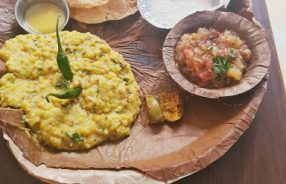Nani Dadi aur Hum
Perhaps, there is no relationship that can match the loving warmth, comfort, and excitement that a grandchild and grandparent share! Add to that the genealogy that brings in matching smiles, similar gait, intelligence that runs in the blood, the shared wit, and not to forget, an inherited palate 🙂
Those of us who have been fortunate to have experienced all these will agree that grandparents are a fount of love, the most cherished companionship of childhood, the treasure trove of stories, and the best playtime mates. Our grandmothers have pampered us with the choicest delicacies and so have many of our grandfathers.
I have traversed a beautiful journey in this realm – having shared my life, albeit for a little over half a decade, with two of my four great-grandparents. I spent a very sweet and memorable childhood with my grandparents and have been extremely grateful that three of them could visit me and bless me when I turned a mother and when I built my home. From them, my nani and dadi, I inherit my interest in food.
My dadi was a wonderful storyteller. I recall how beautifully she would narrate her experience around her father’s farms – tales of the freshest of meat specially prepared for Vijay Dashmi or Holi or on my dada’s visit to her naihar (parents’ home) and tales around the simplest vegetables prepared with such care and devotion – her narration made the entire scene come alive! And, trust me, not just the scene, my interest around aromas are because of these enlivened scenes she would paint on an evening tea-time canvas with sheer words in Magahi (the language of Magadh)!
The other trick she handed down to me was the magic of tani-mani sarson ka tel aur pakkal mirchaai (a very little hint of raw mustard oil and roasted green chillies) in my salads. She prepared many dishes with aplomb as she nurtured her children, managed her stately household, and anchored her family during her younger days but what has stayed with me and grown with me are the delicious Ol ka koocha (elephant foot yam), saanal chooda ( can qualify as a salad made with sprouts, veggies, and beaten rice), beautifully sealed pedakiyas (consecrated pastry pockets stuffed with a sweet filling), delectable matar tamatar ka salaad (tomato and peas salad), boot ka salaad (boot is chana, black chickpeas salad) etc. However, my personal favourites are tessi ka gulgulla (rice flour dumplings filled with jaggery and flax seeds) and besan ka dhokha (a curry made with boiled cakes of gram flour). Dadi taught me how to prepare both these dishes when she came to my home to celebrate my first wedding anniversary – priceless moments and cherished learnings.
Sometimes I feel, in her own humble way, she warned us against the over-perfection around food, the use of chemicals et al. An instance has stayed with me all these years. We had a free-flowing saltshaker placed on our dining table. My dadi wondered how it was possible. Her opinion was that it is a basic characteristic of salt to moisten if left out in the open so if it is not holding the moisture then it certainly is not good for us. One afternoon, post-liberalisation when our markets flaunted Washington apples and Chinese cabbage, she pointed out that though it was good to have such large cloves of garlic as they are easier to peel but wondered if our soil would have enough strength to grow such large cloves of garlic. She said such (GM) crops are an interference with Nature’s ways. So perhaps these snippets from her has made me a very careful informed buyer and consumer who always seeks to establish a relationship with vendors so I know where my food comes from.
My nani too has deeply influenced my learning and enthusiasm around food. From a very simple yet regal accompaniment of ghee pyaaz (slivers of onion caramelised in ghee) to the exotica of caramel pudding and the various varieties of vegetarian and non-vegetarian kababs and cutlets, numerous traditional desserts, and many delicacies from across India to the best vanilla sponge cake – she reigns in my heart as the mistress of serving love through a platter of food!
My summer vacations were bugled in with pheni (a deep-fried rolled crosshatch pastry dipped in thick sugar syrup), the first dish nani would offer us when we landed in her home. Lots of delicacies from chicken curries and fried fish to mild raitas and fragrant pulao would follow along with super-soft malai koftas and dahi vadas! And, interestingly, despite having so much on my plate I still waited for the dessert – Nani’s desserts were season-driven – mangoes and cream for the summers and gajar ka halwa for the winters. She reserved the kheer or phirni for all poojas and birthdays 🙂
I recall when we were in Guwahati and Kolkata in the 80s, nani would send thekuas , nimki, pedakiyas, and aam ka achaar with an aunt of mine who was an airhostess then.
That aam ka achaar was sheer magic. I learnt how to make it when my nani was visiting me in Bengaluru 15 summers ago. She and nana were here to spend a few days in our new home with us – such a fortune life gifted me with!
I now see my children enjoying this beautiful connection with their grandparents – I am the bridge, again on a learning curve, and even in this relationship food plays a pivotal role in creating memories and ever-cherished bonds as both, the kids and grandparents, are discovering how their taste buds lean on each other’s and I feel blessed as I hear the chortles rise from our dining area!




